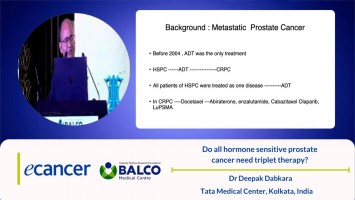1st Immunotherapy of Cancer Conference (ITOC 1)
Biomarker development for ipilimumab and prostate GVAX treatment
Prof Tanja D. de Gruijl - VU University Medical Centre, Amsterdam, The Netherlands
I’ll be presenting data from a trial, a clinical study that we did quite a few years back by now, in patients with advanced prostate cancer who we know had rising PSA levels meaning that they would get metastases but they weren’t clinically apparent yet. That’s a lovely window because you have a minimal disease burden so not so much immune suppression so it’s a good time to test a vaccine and that’s what we did at the time, an experimental vaccine against prostate cancer. We were the first to combine it with a checkpoint inhibitor against CTLA4 which is a brake on the T cells. So it was a two-pronged approach: on the one hand activate the immune system against the cancer; on the other hand take off the brakes from the T cells that should do the actual job. My main task was to immunomonitor the patients to see what was going on, if we could find evidence of immune activation and to see if we could find leads about biomarkers to see which patients responded, which patients did not and could we use that knowledge to select patients next time who might particularly benefit from the approach.
These were 28 patients; we did a phase I trial in which we escalated the dose of the checkpoint inhibitor and then we did an expansion phase where we tested another 15 patients with the combination with some very good results. We got some nice clinical responses – patients with PSA levels dropping, bone metastases regressing, evidence of that on the bone scan, and quite a few of them lived quite a long time so we were very happy with the results, it looked very promising.
Did you establish a sub group of patients who responded best?
Yes, there was certainly a subgroup that responded better and when we did the immunomonitoring it turned out that these were the patients who up front, before they were treated, had the lowest levels of suppressive immune subsets in their peripheral blood and high levels of certain immune stimulatory subsets like dendritic cells, the cells that should start the immune response, they had good activation of these dendritic cells; they had low levels of regulatory T cells that suppressed the immune system. So based on that it seemed like there was a subset of patients with a particularly good immune profile that seemed to benefit most from the whole experience of the particular combination.
There are biomarkers that you can use to select patients?
Some of those biomarkers we now started to explore in other patient groups to see if this is a prostate cancer specific thing, whether we also find them in other types of patients that also get immunotherapy or not because it might also just be a prognostic marker so patients might do better anyway with an immune profile like that. We know that that’s the case because they’re better equipped to deal with the tumour anyway.
What other disease types have you looked at?
Melanoma, renal cell cancer, those two in particular. We’ve moved forward and one of the things we’re testing right now is to see we use the anti-CTLA4 systemically, meaning that the patients got it IV, and it can have severe consequences, there can be some autoimmune events, severe side effects. So right now we’re seeing in early stage melanoma patients if we can give one low dose of that particular drug and if we can get the same immune activating effect without the side effects. So that’s a little trial that actually came from this trial where we’re hoping to take that into the future.
What would be your take home message for doctors?
I think most doctors by now are becoming aware of the new possibilities in immunotherapy and that it has actual clinical effects and it’s very promising. So they should keep that in mind. For your average doctor right now, they might not be able to do anything with that knowledge at the moment but in the future I’m sure that genetic profiling, but also immune profiling, might be standard practice in a lot of patients to see if they’re amenable to immunotherapy and that will become part of the standard arsenal against cancer. So these sorts of profiling, profile determination, will also become important.








